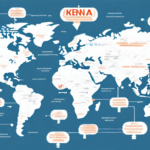Understanding UPS Shipping Rates for 50 Pounds from the USA to Kenya
Shipping packages internationally can be complex, especially when determining shipping rates. In this article, we provide an in-depth analysis of UPS shipping rates for sending a 50-pound package from the United States to Kenya. We explore the various factors influencing UPS shipping costs, offer tips for saving money, and address common challenges with effective solutions. Let’s delve into the world of UPS shipping to ensure a smooth and cost-effective experience.
The Basics of International Shipping with UPS
UPS is a leading shipping company renowned for its reliable international shipping services. To initiate an international shipment with UPS, you need the following information:
- Destination country
- Package weight and dimensions
- Declared value of the package
- Item classification (prohibited or restricted items)
UPS provides detailed information on prohibited and restricted items on their website. Ensuring your items comply with destination country regulations is crucial to avoid shipment delays or rejections.
International shipping with UPS also requires additional documentation, such as customs forms and commercial invoices. These documents are mandatory for customs clearance and must accurately describe the contents and value of your package. UPS offers assistance in completing these forms and provides guidelines tailored to your specific shipment needs.
Choosing the Right Shipping Method for Your Package
UPS offers several international shipping options, each with distinct delivery times and costs:
- UPS Worldwide Expedited®: Economical shipping with delivery times ranging from 2-5 business days.
- UPS Worldwide Saver®: Faster delivery within 1-3 business days.
- UPS Worldwide Express®: Expedited shipping with delivery typically by the next business day.
Selecting the appropriate shipping method depends on your timeline and budget. For a 50-pound package, UPS Worldwide Expedited® generally offers the most cost-effective rate, while UPS Worldwide Express® ensures the fastest delivery.
Additionally, consider the level of tracking and insurance required. UPS Worldwide Express® provides comprehensive tracking and higher insurance coverage, which is beneficial for valuable or fragile items.
UPS Shipping Rates and Fees: What You Need to Know
UPS shipping rates are influenced by several factors, including package weight and dimensions, chosen shipping method, and destination country. For a 50-pound package to Kenya, rates will vary based on these parameters. Typically, UPS Worldwide Expedited® offers lower rates but with longer delivery times, whereas UPS Worldwide Saver® and UPS Worldwide Express® have higher rates for faster delivery.
UPS also provides additional services such as declared value coverage, signature requirements, and insurance, which incur extra fees. Businesses shipping frequently with UPS may qualify for discounts based on shipment volume, so it’s advisable to consult with UPS representatives to explore available savings.
For more detailed information on current rates and services, refer to the official UPS rates page.
Factors That Affect the Cost of Shipping with UPS
Several factors determine the cost of shipping a 50-pound package with UPS:
- Package Weight and Dimensions: Heavier and larger packages incur higher shipping fees.
- Destination Country: Shipping to Kenya involves different rates compared to other countries due to distance and regional logistics.
- Shipping Distance: Longer distances typically result in higher shipping costs.
- Additional Services: Express delivery, insurance, and signature requirements add to the overall cost.
- Seasonal Demand: Rates may increase during peak seasons like holidays due to higher demand.
Moreover, the type of item being shipped can impact the cost. Hazardous materials or fragile items may require special handling and packaging, leading to additional fees. Ensure proper labeling and packaging to minimize unexpected costs.
How to Calculate Shipping Costs for Your Package
UPS offers a comprehensive shipping calculator on their website to estimate costs. To calculate shipping costs for a 50-pound package from the USA to Kenya, you need to provide:
- Origin and destination addresses
- Package weight and dimensions
- Declared value of the package
- Desired shipping method
After entering these details, the calculator will present various shipping options with their respective costs and delivery times. It’s advisable to compare these options and consider any additional services you might need, such as insurance or signature confirmation.
Additionally, comparing prices from different shipping carriers can help you secure the best deal for your shipping needs. Look out for promotional discounts or volume-based pricing offered by UPS and other carriers.
Understanding Customs Regulations and Taxes When Shipping Internationally
International shipments are subject to customs regulations and taxes imposed by the destination country. For shipments to Kenya, it's essential to comply with the Kenyan Customs Service requirements. Common considerations include:
- Prohibited and Restricted Items: Ensure your package does not contain any items banned or restricted by Kenyan law.
- Customs Duties and Taxes: The recipient may be liable for import duties and taxes based on the declared value of the package.
- Documentation: Accurate customs forms and commercial invoices must accompany the shipment to facilitate smooth customs clearance.
Failure to comply with these regulations can result in delays, additional fees, or even the seizure of your package. For detailed information, consult the Kenyan Customs Regulations or contact UPS customer service.
Moreover, different shipping methods may have varying implications for customs processing. For instance, express shipping might expedite customs clearance but could also attract higher duties and taxes compared to standard shipping.
Tips for Saving Money on International Shipping with UPS
Here are some effective strategies to reduce your international shipping costs with UPS:
- Select Economical Shipping Methods: Opt for UPS Worldwide Expedited® for lower rates when delivery speed is not critical.
- Optimize Packaging: Use appropriately sized packaging to minimize weight and dimensions, as shipping costs are based on these factors.
- Consolidate Shipments: Combine multiple items into a single shipment to take advantage of bulk shipping rates.
- Leverage Business Discounts: Businesses can negotiate discounted rates with UPS based on shipping volume.
- Plan Ahead: Avoid last-minute shipping during peak seasons to prevent higher rates and ensure better deals.
Implementing these tips can lead to significant savings on your international shipping expenses.
Tracking Your Shipment: What You Need to Know
UPS provides a robust tracking system that allows you to monitor your shipment’s progress in real-time. By using the tracking number provided at the time of shipment, you can access detailed updates on your package’s status through the UPS website or mobile app.
Key features of UPS tracking include:
- Status Updates: Receive live updates on each stage of the shipment process.
- Notifications: Opt-in for email or text alerts to stay informed about any delays or delivery confirmations.
- Delivery Estimates: Get accurate delivery windows based on the selected shipping method.
Tracking your shipment helps ensure transparency and allows you to address any issues promptly by contacting UPS support if needed.
Common Challenges When Shipping Internationally and How to Overcome Them
International shipping with UPS can present several challenges, including:
- Delays in Transit: Can occur due to customs processing or logistical issues.
- Lost Packages: Though rare, packages can sometimes go missing during transit.
- Unexpected Fees: Additional charges may arise from customs duties or incorrect documentation.
To mitigate these challenges:
- Accurate Documentation: Ensure all customs forms and invoices are correctly filled out.
- Proper Packaging: Securely package items to prevent damage and loss.
- Insurance Coverage: Insure valuable shipments to protect against loss or damage.
- Monitor Shipments: Use UPS tracking to stay informed about your package’s status and address any issues immediately.
What to Do if Your Shipment is Delayed or Lost in Transit
If your shipment experiences delays or gets lost, follow these steps:
- Contact UPS Customer Service: Reach out to UPS to inquire about the status of your shipment and seek assistance.
- Check Tracking Information: Review the latest tracking updates to identify where the delay or loss occurred.
- File a Claim: If your package is lost, submit a claim for declared value coverage to receive compensation.
- Review Insurance: If you have insurance coverage, coordinate with UPS to process the claim.
UPS offers a money-back guarantee on some of their shipping services, ensuring refunds for delayed deliveries in specific scenarios.
How to Avoid Common Packaging Mistakes That Can Cost You Money
Proper packaging is essential to prevent damage and avoid additional shipping costs. Common packaging mistakes include:
- Using Incorrect Box Sizes: Selecting a box that is too large or too small can increase shipping costs and risk damage.
- Inadequate Packing Materials: Insufficient padding can lead to item damage during transit.
- Incomplete Labeling: Missing or incorrect labels can cause delays and additional fees.
To avoid these mistakes:
- Choose the Right Box: Use a box that snugly fits your items to minimize movement during shipping.
- Use Quality Packing Materials: Invest in sturdy boxes, bubble wrap, and packing peanuts to secure your items.
- Label Clearly: Ensure all labels are complete, accurate, and securely attached to the package.
Adhering to UPS packaging guidelines can enhance the safety of your shipment and reduce the likelihood of incurring extra costs.
The Benefits of Using a Professional Shipping Service like UPS
Choosing a professional shipping service such as UPS offers numerous advantages:
- Expertise: UPS has extensive experience in international shipping, ensuring your package is handled correctly.
- Global Network: With a vast international network, UPS ensures efficient delivery to Kenya and other destinations worldwide.
- Comprehensive Services: UPS provides tracking, insurance, and various shipping options to meet diverse needs.
- Reliability: Known for punctual deliveries and dependable service, UPS minimizes the risk of shipment delays.
Leveraging UPS’s professional services can enhance your shipping experience, providing peace of mind that your package will arrive safely and on time.
Best Practices for Packing and Labeling Your Shipment for International Delivery
Effective packing and labeling are critical for successful international shipping. Follow these best practices:
- Select Appropriate Packaging: Use strong, durable boxes that can withstand international transit conditions.
- Secure Your Items: Use adequate padding materials like bubble wrap or foam to protect your items from damage.
- Label Accurately: Clearly print the recipient's address, return address, and include all necessary customs documentation.
- Use Sealed Adhesive Labels: Ensure labels are securely attached to prevent them from detaching during transit.
Proper packing and labeling not only protect your items but also facilitate smooth customs clearance and timely delivery.
How to Choose the Right Insurance Coverage for Your Shipment
Selecting the appropriate insurance coverage is essential to protect your shipment against loss or damage. UPS offers several insurance options:
- Declared Value Coverage: Covers the declared value of your package in case of loss or damage. The coverage amount depends on the package's value and destination.
- Additional Insurance: For high-value or fragile items, consider purchasing additional insurance to ensure full coverage.
When choosing insurance, consider the value of the items being shipped and the potential risks involved. Reviewing UPS’s insurance policies and understanding the coverage limits can help you make an informed decision.
For more details on UPS insurance options, visit the UPS Insurance Page.
In conclusion, shipping internationally with UPS involves understanding the required information, selecting the appropriate shipping method, and managing shipping rates and fees effectively. Proper packaging, accurate labeling, and comprehensive knowledge of customs regulations are vital to ensure your package reaches Kenya safely and on time. By following these best practices and leveraging UPS’s professional services, you can navigate international shipping challenges with confidence and efficiency.



















